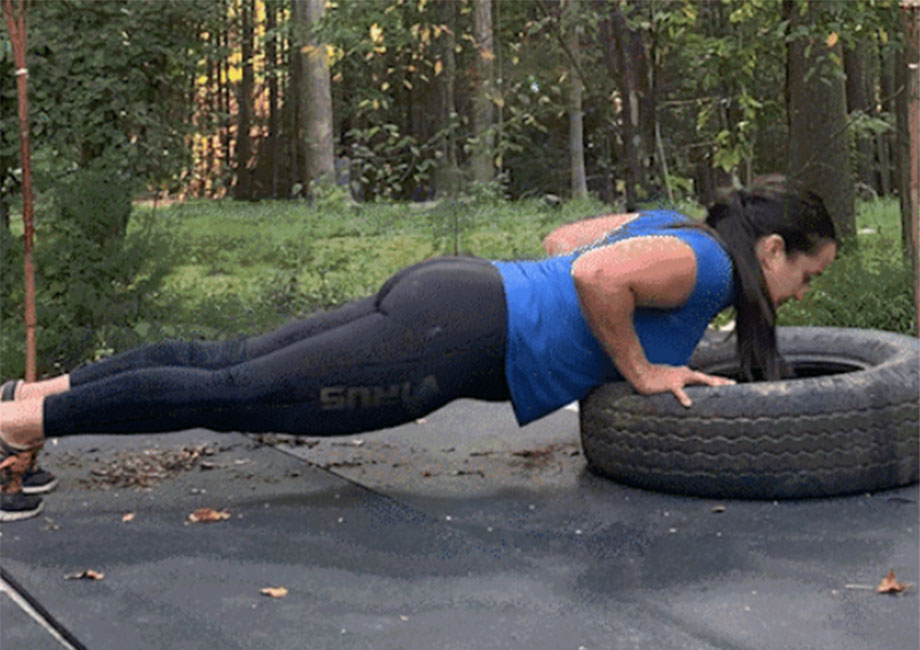We test and review fitness products based on an independent, multi-point methodology. If you use our links to purchase something, we may earn a commission. Read our disclosures.
Are you tired of your standard workout routine? Will you flip if you have to do anymore exercises with barbells, dumbbells, and kettlebells? Good news: there’s a way to get a full-body workout and you won’t have to touch a single free weight!
RELATED: Full-Body Workout vs. Split
All you need is a tire and you’ll unlock exercises that build strength, improve cardio capacity, increase endurance, and provide muscle activation from head to toe.
Amanda Capritto, CPT, CES, CNC, CF-L1, CSNC, and GGR Senior Staff Writer, tells us everything you need to know to get set up for tire workouts, including what size tire to use, benefits of tire training, and tire exercises that’ll help get you in tip-top shape!
What Size of Tire Do You Need?
“So, all I’ll need is the spare tire off my Toyota, and I’m good to go, right?”
WRONG, the tires required for this total-body blaster tend to weigh between 200 and 300 pounds. You’ll need the tires of a commercial truck rather than a 25-pound passenger vehicle.
Tractor tires can also work, although these weigh between 300 pounds on the low end and 800 pounds for the larger ones. We strongly advise you to build a strong fitness foundation before expecting to toss it around your yard like you’re the Incredible Hulk.
RELATED: The 5/3/1 Workout: Exploring The Legendary Powerlifting Program
Where Can You Get a Tire?
There are fitness-specific tires available, but some of them are pretty pricey. Life Fitness, for example, charges nearly $2,000 for an 88-kilogram tire. That’s a lot of money for something you could feasibly find for free at a junkyard!
“Google is your best friend when it comes to finding tires for your home gym,” says Amanda Capritto, CPT, CES, CNC, CF-L1. “Auto body shops, junkyards, tire suppliers that specialize in larger vehicles and tires, and even truck stops with service stations all stand the chance of having tires they’re looking to let go.”
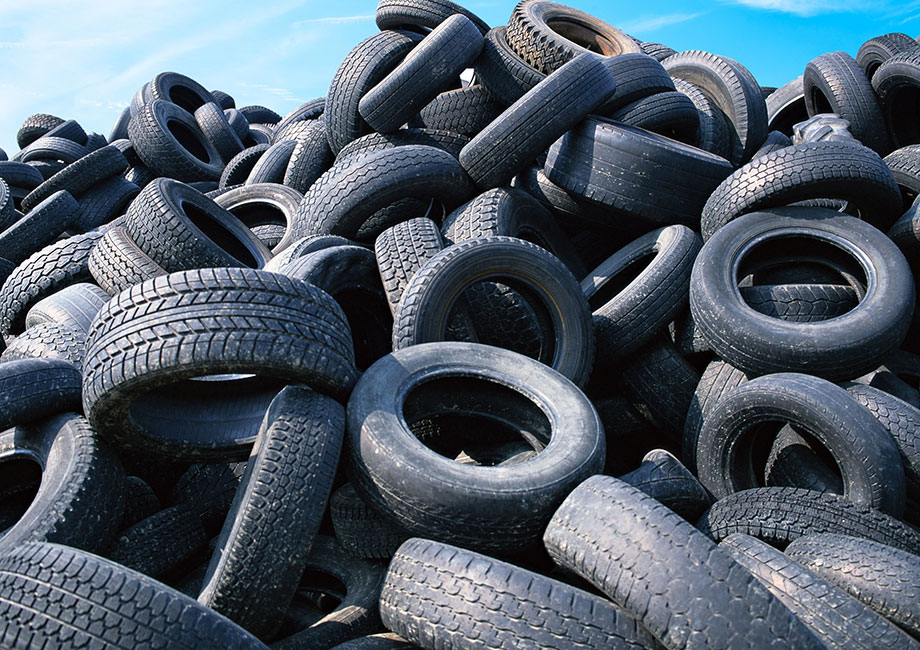
Classified ads and online marketplaces like Craigslist and Facebook marketplace might provide fruitful results, too, as many people rely on these platforms to unload “junk” and, as they say, one man’s trash is another man’s workout tire.
With a little bit of asking around, you should be able to find a tire that’s the right weight, in good condition, reasonably priced, and, if you’re super savvy, you may even be able to work delivery into the deal, too! It never hurts to ask!
Benefits of Tire Workouts
Heavy tires are great for building muscle and strength. That’s why commercial gyms and CrossFit boxes are adding this versatile piece of equipment to their facilities, making it possible to work classic strongman tire flips and other tire exercises into HIIT, CrossFit workouts, and other strength training programs.
RELATED: CrossFit Workouts At Home
“Flipping a tire requires muscle activation throughout the entire body,” says Amanda. “It’s a full body exercise that uses your posterior chain muscles to deadlift the tire initially, pulling muscles to bring it above waist level, and upper body pushing muscles to topple it.”
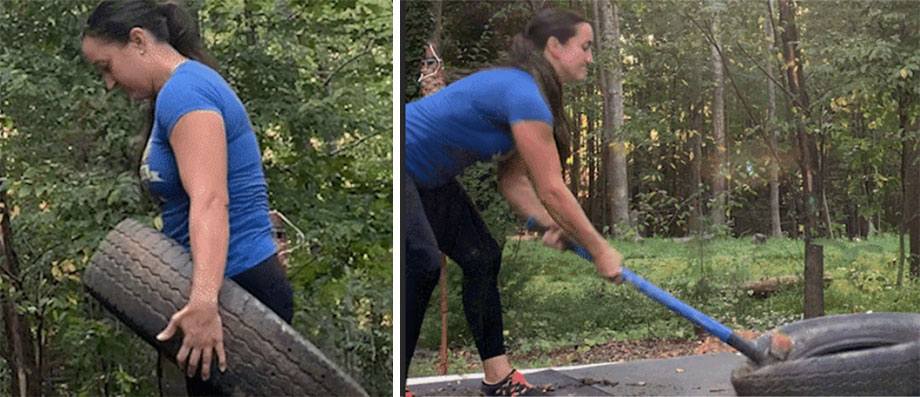
According to a 2019 review in Sports Medicine – Open1, the tire flip is effective as “a strength and conditioning training tool…for power, strength, endurance, and metabolic conditioning training.”
Additionally, a 2020 study in Biology of Sport2, subjects showed a multitude of improvements, including better bench press performance, enhanced endurance, and improved agility, after an “eight-week tyre flipping training intervention.”
Because the movement involves strength, explosive power, coordination, and endurance, it truly is the full package.
RELATED: Conditioning Workouts
Tire Exercises
Without further ado, we’re sharing our favorite tire exercises to help you add some variety to that tired old workout routine!
Tire Flip
Why we love it: The classic tire flip exercise provides activation to both your upper body and lower body muscles. It also helps get your heart rate up, enhancing your cardio conditioning, too!
How to do it:
- Stand with your feet shoulder-width apart.
- Bring your hips back and bend your knees, placing your palms under the tire.
- Drive through your heels and bring your hips forward to stand, pulling the tire upward.
- As the tire reaches waist height, bend your knees again to dip and “catch” the tire, in a partial squat position with your fingers now facing up instead of down.
- Push the tire forward until it topples.
Muscles worked: Quads, hamstrings, glutes, chest, traps, shoulders, biceps, core
RELATED: HIIT Cardio Workout At Home
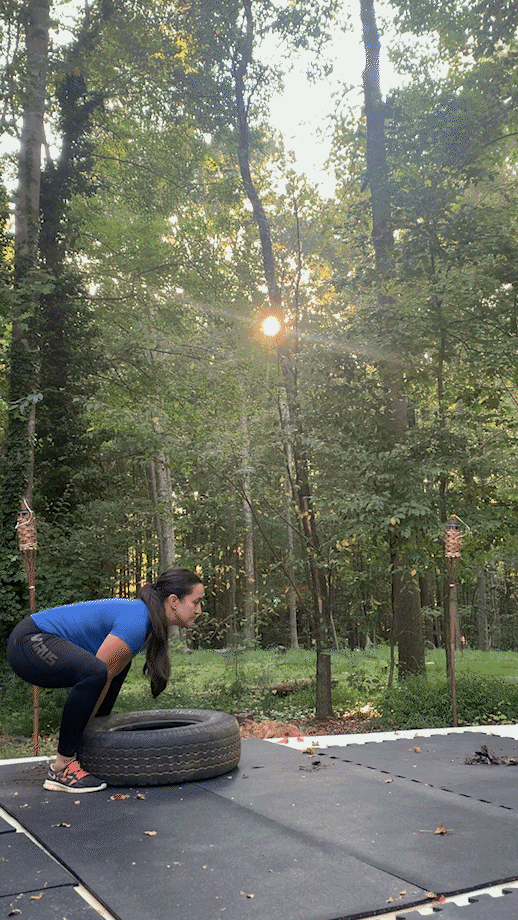
Tire Slam with Sledgehammer
Why we love it: “Slamming a tire with a sledgehammer involves many muscle groups,” says Amanda Capritto, CPT, CES, CNC, CF-L1. “It improves coordination, builds grip strength, and it’s an amazing way to vent some aggression, making it great for stress relief too!”
RELATED: Grip Strength Exercises
How to do it:
- Stand perpendicular to your tire with your feet hip-width apart.
- Hold the handle of your sledgehammer with two hands and wide grip.
- Swing the sledgehammer back, up, and over your far shoulder.
- Explosively swing it across the body to slam the tire, finishing with your hands together at the end of the sledgehammer handle. Keep your face a safe distance away from the tire and the sledgehammer, as the hammer could bounce off and hit you in the face.
- Complete the desired number of repetitions, then switch sides and repeat the set.
Muscles worked: Back, shoulders, traps, arms, core
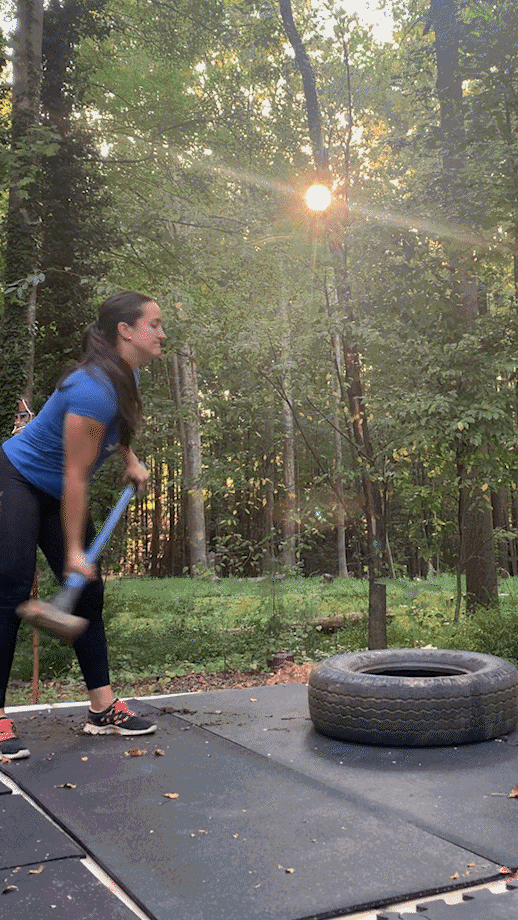
Tire Push-ups
Why we love it: The tire’s height converts your regular bodyweight push-ups into incline or decline push-ups, respectively. Tires are also slightly unstable, which forces you to use your core and stabilizing muscles to keep yourself steady.
How to do it:
- For incline push-ups, place your hands on the tire with your feet on the floor behind you. For decline push-ups, place your hands on the floor and your feet on the tire behind you.
- Bend your elbows, keeping them tucked against your torso, to lower your body.
- Lightly touch the floor or tire with your chest, then push yourself back up.
Muscles worked: Chest, triceps, shoulders, core
RELATED: What Muscles Do Push-Ups Work?
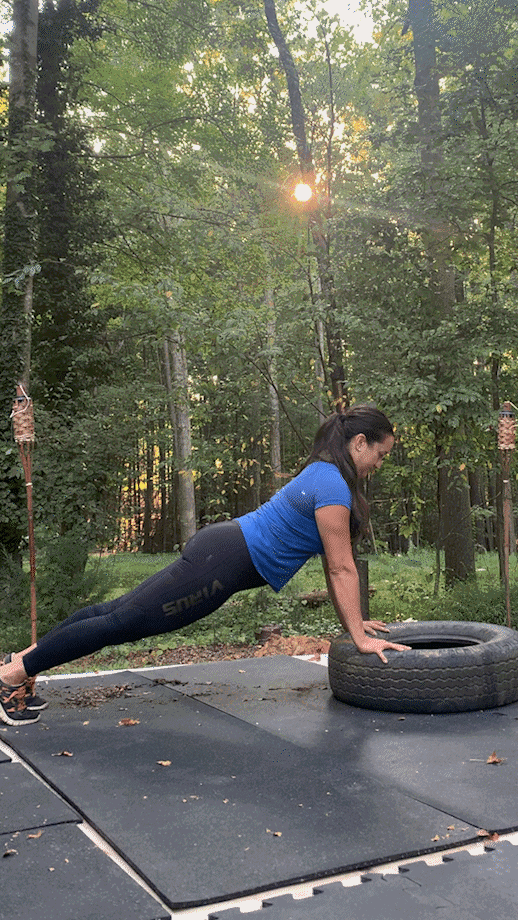
Tire Dips
Why we love it: “Triceps dips are considered an isolation exercise because of how much activation they provide to the triceps brachii,” says Amanda, “but they’re also good for your shoulders, chest, and core.”
How to do it:
- Stand with your back to the tire and both hands on the top of the tire behind you.
- Walk out your feet. The farther your feet, the harder the exercise.
- Bend your elbows to lower your body. Continue until they form 90-degree angles.
- Briefly hold the end position, then push yourself back up to the starting position.
Muscles worked: Triceps, shoulders, chest, core
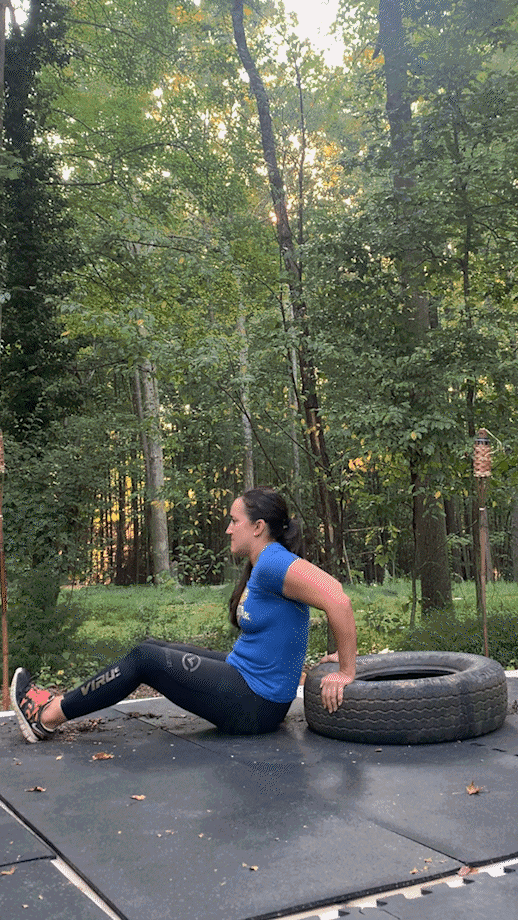
Tire Farmer’s Carry
Why we love it: Also called the farmer’s walk, this exercise builds strength and muscle throughout the entire body, improves core strength and stability, and enhances cardio and endurance. It’s usually done with free weights, but tires totally work too!
How to do it:
- Stand inside your tire with your feet hip-width apart.
- Push your hips back and bend your knees so you can get a grip on the tire.
- Drive through your heels and bring your hips forward to deadlift the tire.
- Hold the tire at that height and slowly start walking in a straight line.
- Continue for the desired duration or distance, then drop the tire and rest.
Muscles worked: Quads, hamstrings, glutes, upper back, traps, lats, arms, core
RELATED: Farmers’ Walk Benefits
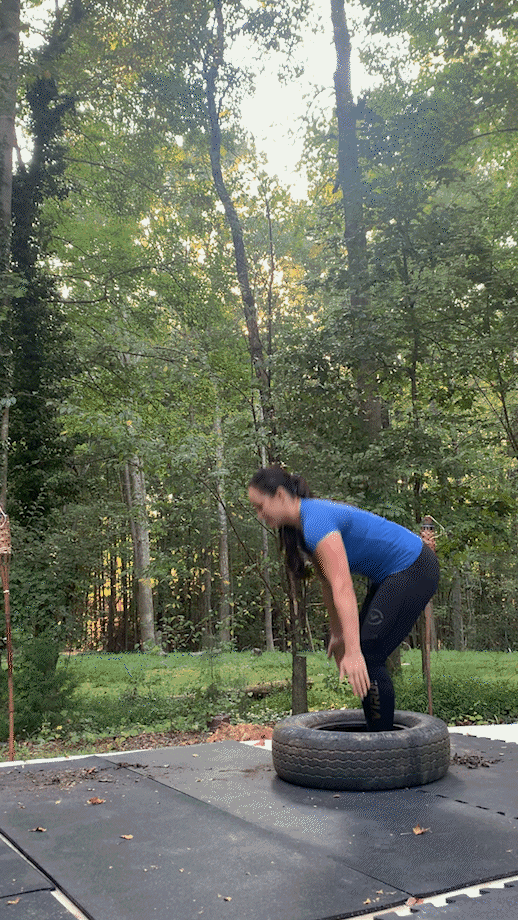
Tire Deadlift
Why we love it: Similar to the trap-bar deadlift, the tire deadlift places reduced strain on the lumbar spine, making it ideal for those with chronic low back pain due to its unique positioning.
How to do it:
- Stand inside your tire with your feet hip-width apart.
- Push your hips back and bend your knees so you can get a grip on the tire.
- Drive through your heels and bring your hips forward to stand up.
- Squeeze your traps and glutes at the top, then return to the starting position.
Muscles worked: Back, traps, glutes, hamstrings, quads, core
RELATED: Best Trap Bars
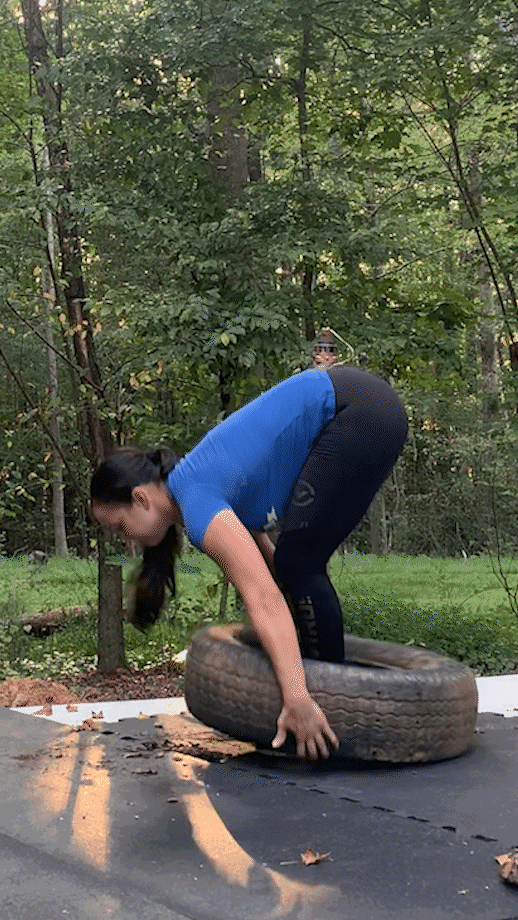
Tire Drags
Why we love it: According to the Journal of Sports Medicine and Physical Fitness3, “tire pulling even at slow speeds has an energy requirement that is so large that the activity may be feasible as endurance training.”
How to do it:
- Wrap a length of rope around a tire and then around your waist. If you have a harness for sled pulls, you can fasten the rope to your harness for a quick and secure setup.
- Walk until the line is taut, then walk or run in a straight line, dragging the tire behind you.
- Continue for the desired distance or duration.
Muscles worked: Back, glutes, legs, core
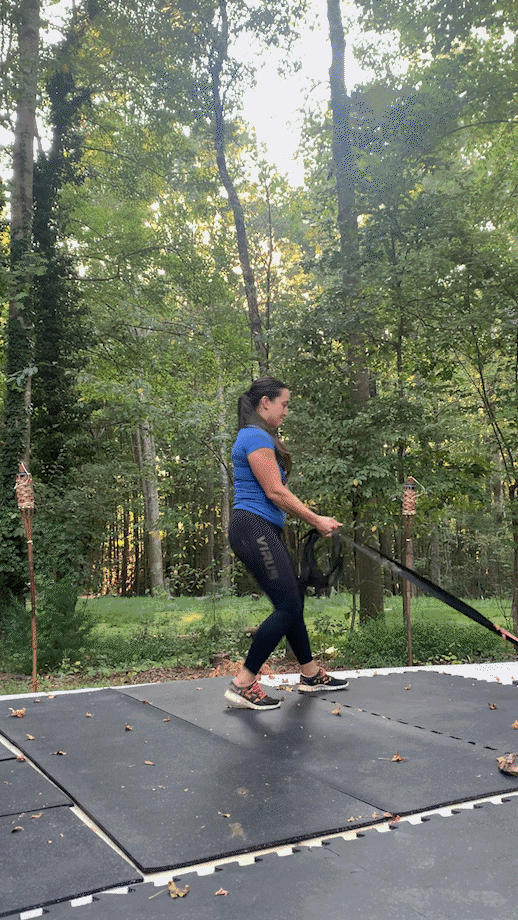
Tire Squat and Press
Why we love it: “The tire squat and press builds impressive lower body strength during the squat portion, but the press portion also provides activation in the upper body,” says Amanda.
How to do it:
- Begin as you would if you were doing a tire flip, but stop before toppling the tire.
- Starting with your tire vertical or at a 45-degree angle, bring your hips back and bend your knees to squat, holding the tire steady with both hands as you descend.
- Continue until your thighs are nearly parallel, then drive from your heels and push with your arms to return to the starting position.
Muscles worked: Quads, hamstrings, glutes, chest, traps, shoulders, triceps, core
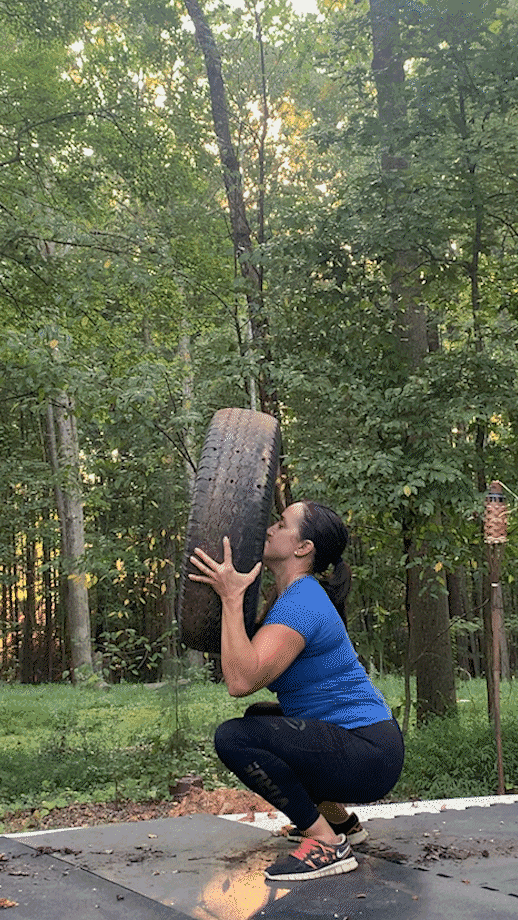
Sample Tire Workout
The amount of sets and reps you’re capable of for this workout will depend on your fitness goals, current fitness level, and the weight of your tire. Obviously you’ll be less likely to cycle reps with a 300-lb tire than you would using something between 100 and 200 pounds.
Our sample tire workout is designed to jack up your heart rate, burn calories, build muscular endurance, and assist with weight loss. Make sure to work in some of the best warm-up exercises before you start!
| Exercise | Sets | Reps |
| Tire Flips | 2 to 3 | 6 to 12 |
| Tire Push-Ups | 2 to 3 | 6 to 12 |
| Tire Slam with Sledgehammer | 2 to 3 | 6 to 12 |
| Tire Flips | 2 to 3 | 6 to 12 |
| Tire Farmer’s Carry | 2 to 3 | 30 to 90 seconds |
“Our tire workout is similar to many CrossFit workouts. The goal is to move from one exercise to the next to the next with minimal rest, completing one round at a time, then taking the whole set from the top for a total of two or three rounds,” says Amanda Capritto, CPT, CES, CNC, CF-L1, and GGR Senior Staff Writer. “For beginners, don’t worry about the timer too much and just aim to get through it. Once you get your bearings, write down your total time and try to set a new record each time you take it on!”
RELATED: How Many Reps to Build Muscle
Tire Workouts: Final Thoughts
If the treadmill has you feeling like a hamster on a wheel, and you’re sick of the same old free weight exercises in every single gym session, then trying a tire workout might just be the thing to break you out of your workout routine monotony.
Tire workouts:
- Help provide a full-body workout
- Can help improve your strength and conditioning
- Switch things up to stave off boredom
Don’t let your training routine burn you out; try our tire workout today for an exciting new way to train that’ll ultimately help you achieve your fitness goals!
Tire Workouts: FAQs
Is flipping a tire a good workout?
Flipping a tire is an incredible workout. It works various muscle groups, requires explosive power, coordination, agility, and endurance. It’s basically the total package.
How do you train for a tire flip?
Beginners might want to try a lighter tire to start, but there are some other more traditional exercises that could help you “get your legs,” so to speak, before trying this Strongman classic.
“Barbell deadlifts and squats will help you get accustomed to the biomechanics here,” says Amanda Capritto, CPT, CES, CNC, CF-L1, and GGR Senior Staff Writer. “Starting with traditional exercises gives you a good fitness base to build off of, so you’re not trying to build strength for the tire flip and figure out the form at the same time.”
What exercise is similar to tire flips?
The tire flip is fairly unique, considering the equipment required here, but the biomechanics are similar to the deadlift and squat. Familiarizing yourself with these fundamentals will give you a leg up when learning the tire flip exercise.
RELATED: Deadlift Muscles Worked | What Muscles Do Squats Work?
References
1. Hindle BR, Lorimer A, Winwood P, Keogh JWL. The Biomechanics and Applications of Strongman Exercises: a Systematic Review [published correction appears in Sports Med Open. 2020 Feb 5;6(1):8]. Sports Med Open. 2019;5(1):49. Published 2019 Dec 9. doi:10.1186/s40798-019-0222-z
2. Wong DP, Weldon A, Ngo JK. Physical fitness improvements of 8-week light vs. heavy tyre flip training in young adults. Biol Sport. 2020;37(3):203-210. doi:10.5114/biolsport.2020.94247
3. Fredriksen PM, Mamen A. Energy requirements of tire pulling. J Sports Med Phys Fitness. 2017;57(10):1245-1251. doi:10.23736/S0022-4707.17.06896-7
Further reading

What are the different types of creatine, and which type is the most effective? A dietitian explains what you need to know. Read more

These wall exercises can be done anywhere and provide a total-body workout with no special equipment required. Read more

Looking for the best folding treadmill for your home? I’ve compiled my favorites – and there is something for everyone. Read more

In our Evie Ring review, we discuss the pros and cons of this wearable smart ring with a focus on women’s health. Read more

